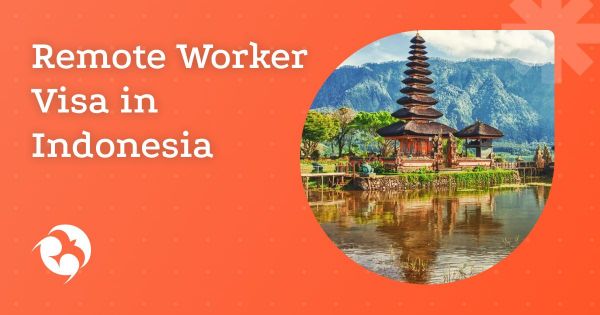In Indonesia, KITAS is a familiar legal term. It stands for Kartu Izin Tinggal Terbatas, or temporary residence permit card. In essence, it is a permit to stay in the country for a period of 6 months to several years, issued to a foreigner on the basis of specific purposes: contract work, entrepreneurship, internship, study, family reunification.
Sometimes there is confusion around KITAS with similar-sounding words and abbreviations. To understand, let’s look at the main terms:
- VITAS (Visa Izin Tinggal Terbatas) is a “limited stay visa” obtained at the Indonesian embassy or consulate before entering the country. It is actually a preliminary step. With it, a person enters Indonesia, and once inside the country, converts the visa into a full residence permit.
- ITAS (Izin Tinggal Terbatas) – “temporary residence permit”. This is a legal form of document confirming the right to reside.
- KITAS – a plastic card in the format of a bank card. This is what is issued to a foreigner. Formally, ITAS is a right, KITAS is a certificate of this right.
- Remote Worker Visa or “visa for digital nomads” is a separate initiative of the Indonesian authorities. It gives foreigners the opportunity to live and work remotely for foreign companies without income taxation in Indonesia for 5 years.
From a legal point of view, KITAS is not a classic “visa”. This is a temporary residence permit, which is issued after receiving an entry visa (VITAS).
Why is this important? KITAS turns a tourist into a full-fledged resident by law. With it you can:
- conclude employment contracts;
- open a bank account in local banks;
- rent housing for a long term without complex clauses;
- obtain a local driver’s document;
- legally stay in the country for years without the need for regular “visa runs”.

- We will answer all your questions
- We will help you choose the best option
- We will guide you through every step or do everything for you
Types of KITAS visas
KITAS for digital nomads – Remote Worker Visa, index E33G
A project launched in 2023-2024 as an experiment for “digital nomads”.
- Reason: working remotely for a foreign company, without receiving Indonesian income.
- Validity: initially announced for up to 5 years, but in fact, it is usually issued for a year with the possibility of extension.
- Feature: exemption from taxation in Indonesia on income received from abroad (but provided that there is no Indonesian source of income).
- Purpose: to legalize the stay of an influential segment of foreigners working online.
Worker KITAS, index 312
A classic category for expats. The basis is an employment contract with an Indonesian company. Validity is 6-12 months, then extension is possible. Required:
- RPTKA (Rencana Penggunaan Tenaga Kerja Asing) – a plan for the use of foreign labor, a document from the Ministry of Labor confirming the need to hire a foreigner.
- IMTA (Izin Mempekerjakan Tenaga Kerja Asing) – official permission to employ a foreigner. Without it, you cannot apply for a KITAS.
- MERP (Multiple Exit Re-entry Permit) – a separate permit for multiple exits and entries. Without MERP, leaving the country effectively cancels the KITAS. Therefore, workers almost always need to additionally apply for this document along with the KITAS.
Family or spousal KITAS, indexes 317/318
The basis is a registered marriage with an Indonesian citizen (317) or being in his family as a child/dependent (318). Usually issued for 1 year, renewable annually. Grants the right to legal residence, opening an account, access to health insurance, real estate and services, but does not allow employment. To work legally, you need to change the KITAS type.
Pension KITAS, index 319
Reason: age 55+, confirmed stable income of at least USD 1,500 per month, rental housing and health insurance. For foreigners who want to spend long seasons in Indonesia, especially in Bali. Valid for 1 year with the possibility of annual renewal up to 5 years. Work in this category is prohibited. The main advantage is long-term residence and full access to services (banks, communications, real estate).
Investor KITAS
Issued for directors or shareholders of a company with foreign capital (PT PMA – Perseroan Terbatas Penanaman Modal Asing). The basis is the presence of a share in the registered company PT PMA. Valid for up to 2 years, with the possibility of extension.
Comparison Table of KITAS Types in Indonesia
| KITAS Type | Index | Validity | Basic | Basic Rights | Restrictions |
| Remote Worker Visa (for digital nomads) | E33G | 1 year | Working for a foreign company remotely, without income in Indonesia | Legal residence, tax breaks on foreign income, access to services | Prohibition on working in Indonesian companies |
| Working KITAS | 312 | 6–12 month. | Employment contract with an Indonesian company | Right to work under a contract, accommodation, opening an account, government services | Requires permits: RPTKA and IMTA; without MERP, multiple entries/exits are not allowed |
| Family/spousal KITAS | 317/318 | 1 year | Marriage or relationship with an Indonesian citizen, dependents of KITAS holders | Accommodation, access to banks, services, insurance | Prohibition on work, employment only through change of status |
| Pension KITAS | 319 | 1 year | Age 55+, income from $1,500 per month, rental housing, insurance | Long-term residence, bank accounts, social services | Strict ban on work |
Alternatives
Alternatives to KITAS are appropriate when the goal is to live in Indonesia for a long time, but without employment or before the launch of PT PMA. Below are 3 working routes: D12 (multiple-entry “pre-investment”), C1 (tourist for 60+60+60) and B211 (single visit up to 180 days). These are different tools for different tasks and stay horizons, from business exploration to long-term tourism without the right to work.
Visa D12 (multiple-entry, “pre-investment”)
D12 is a flexible format for 1 or 2 years, designed for “pre-investment” visits: market research, meetings, preparation for opening a business, without employment and commercial activities on the spot. According to the conditions, they are issued for 1 or 2 years, with each entry allowing up to 180 days of stay; multiple entries with no travel limit during the visa validity period.
C1 visa (single-entry, 60+60+60 up to 180 days)
C1 is a current “long-term tourist” visa (to replace old indexes like 211A), issued as a single entry: the first term is 60 days with the right to two extensions of 60 days, a maximum of 180 days in total per entry. Exit cancels the visa. Repeated entry under the same C1 is not possible – a new application is needed, so there is no multiple entry here. In practice, this is an option for long-term tourism, cultural programs and personal visits, when 30 days of VoA are not enough. You can’t work, but remote work for a foreign employer outside Indonesian jurisdiction is usually treated as acceptable in the absence of local income, although formally C1 is not a work visa.
Long-term visa B211 (single-entry, up to 180 days)
B211 / B211A – a single entry for 60 days with the possibility of two extensions up to a total of 180 days, historically used as “social / business / tourist” before the codes were changed to C1. A sponsor in Indonesia (an individual, company or agent) is required to submit the documents. After 180 days, according to the rules, you must leave the country.
Step-by-step application process
The E33G remote worker KITAS process is built around an online application through a sponsor, income/contract verification, issuance of e-VITAS and conversion to e-ITAS/KITAS with biometrics.
Remote Worker Visa (E33G index) is issued for remote work for a foreign company, without the right to provide services to the Indonesian market. The basic term is 1 year with the possibility of extension. There are 2 key financial thresholds: a one-time balance of $2,000 and a confirmed annual income of $60,000, plus a contract with a company outside Indonesia. This is a transparent verification that the applicant actually “brings” income and does not claim local employment.
Registration procedure
- Preliminary check and collection of documents. You will need a passport, photo, bank statement with a balance of at least $2,000 or proof of annual income of at least $60,000, and a contract with a foreign company. Submission is made through an accredited sponsor/agent, as payments are made through the state gateway simponi.kemenkeu.go.id.
- Application for an e-visa (e-VITAS) through the immigration system. After verification, an entry permit is granted with an entry window of approximately 90 days. This is a critical date for planning flights and border crossings.
- Entry into Indonesia and conversion. After entry, an e-ITAS/KITAS is issued. A visit to the local office for biometrics (photos/fingerprints) and final confirmation of status in the passport/system is required.
- Migration and everyday steps. Once the KITAS is ready, a bank account is opened, local insurance and a driver’s license are issued.
- Extension of status. 2-4 weeks before the expiration of the annual term, you must begin preparing for an extension through the same sponsor.
Required documents
Recruitment for KITAS remote worker E33G is simple, but it checks the applicant’s financial solvency. The authorities request a passport, photo, contract with a non-resident employer and a financial statement. This is a filter for fictitious applications and proof of the absence of local employment. The list of basic documents includes:
- Passport and a scan of the spread.
- Photo.
- Bank statements.
- Employment contract/contract with a foreign company, without an Indonesian source of income.
- Address of residence, contact information for e-visa, submission through a sponsor/agent.
Deadlines, state fees and processing time
You can apply offline or online, but the key deadlines are standard: issuance of an e-visa, entry in 30-90 days and conversion to e-ITAS/KITAS with biometrics. For a remote worker – a year with the right to extend.
The mandatory payments are divided into “immigration” and “work”. For the digital nomad and family, there is no contribution for the foreign worker, unlike the work scenario. This reduces the annual burden and makes the E33G more predictable in terms of the overall cost of processing. Immigration fees include government fees for the e-visa, issuance of the e-ITAS/KITAS, biometrics and the multi-entry stamp in the electronic profile.
Terms and Cost
| Type | Basic Term | Entry/Activation | Registration Term Reference | Cost Reference |
| Remote Worker’s KITAS (E33G) | 1 year, annual renewals | E-visa activation up to ~90 days | Full cycle ~3–4 weeks | from 13 million IDR; acceleration is more expensive |
| Family KITAS | 1–2 years, extensions | e-visa activation up to ~90 days | 7–10 working … days e-stage, then biometrics | ~11 million IDR (1 year), ~16 million IDR (2 years) |
The final figures depend on the urgency, location and composition of the package (sponsorship, extensions, closure).
Taxes
The taxation logic is determined by 2 markers: physical presence for 183+ days and intention to reside (intention to reside). The Ministry of Finance in PMK-18/2021 specifies that the status of a tax resident is formed based on the sum of days for 12 months or on documented intention (ITAS/KITAS > 183 days, long-term contract, lease for a period of > 183 days, etc.).
- If the presence is less than 183 days in 12 months and there is no “intention to reside”, foreign income remains outside Indonesian taxation.
- If the presence is more than 183 days, there is an obligation to register (NPWP) and file a declaration. At the same time, the current procedure exempts foreign income from tax if the conditions of PMK-18/2021 are met.
In practice, this means that the holder of the KITAS of a remote worker with an annual status must assess in advance the 183-day threshold and the documentary trail of intent in order to correctly select the tax regime and not overpay.
MERP: Exit and Return
MERP is issued at the same time as KITAS and coincides in duration, allowing multiple exits and returns without losing status. Exit before the expiration of VITAS→KITAS or without a valid MERP interrupts the process and may cancel the permit. Transition to permanent residence (KITAP) is usually available through the family route after 2 years of marriage to an Indonesian citizen and a valid family KITAS.
Any international trip without a valid MERP actually “burns” the KITAS – you cannot return under it, and the new process will take weeks and additional payments. A properly issued MERP saves time and eliminates forced closure of status.
Transition to permanent residence (KITAP)
KITAP is a permanent residence permit for 5 years with the possibility of extension, which is most often obtained through the family route. A foreign spouse has the right to apply for KITAP after 2 years of marriage with an Indonesian citizen and the presence of a family KITAS. The KITAP consultation pages state a 5-year term, a separate MERP for 2 years with an extension, and a full set of social rights.
Digital nomads and KITAP
The E33G (Remote Worker KITAS) route is not converted to KITAP and is not considered a basis for permanent residence. This status allows you to live for a year and extend the permit, but does not lead to permanent residence. E33G is designed for temporary residence with income from abroad, without inclusion in the country’s economy as an employee or spouse of a citizen.
Even with multiple re-registrations of E33G, the path to KITAP remains closed. To obtain permanent residence, you will need to change the basis – family marriage with an Indonesian citizen and a family KITAS, or other grounds provided by law.
Typical errors and risks
Documents and deadlines
- Passport. The passport must “cover” the validity period of the status. For an annual KITAS, it is appropriate to plan a reserve of at least 12-18 months, otherwise the system will not allow or cut off the term.
- Applications and address. Errors in the name (transliteration), date of birth, passport number, inconsistencies in the rental address and contacts in the application are a common reason for returns or requests for clarification.
- Deadlines for electronic stages. The entry window for an e-visa is limited, and missing the corridor means re-submission and new payments.
Ban on exit until completion
- Upon entry via VITAS, the applicant is required to complete the process to e-ITAS/KITAS, submit biometrics, and issue a permit. Exit before completion of the process cancels the procedure and forces you to start over.
- Practice shows that an attempt to “fly for a couple of days” without a ready KITAS and a valid MERP ends with the case being closed and the need to pay again, and sometimes even a refusal of the next request due to the “unfinished” status in the history.
MERP
- MERP (Multiple Exit Re-Entry Permit) is issued simultaneously with KITAS and for the same period. Departure without MERP equals KITAS cancellation.
- A typical mistake is to think that multiple entries are “built in by default” in the electronic KITAS. Without a completed MERP, a trip abroad closes the permit and may require re-submission.
EPO/status closure
When work ends, a lease is terminated, the reason changes, or a long-term departure, the status is closed via EPO (Exit Permit Only). Skipping an EPO leaves a pending KITAS in the system, which complicates re-submissions and threatens a ban on entry.
Experts recommend closing the status carefully. Obtain an EPO, hand in the card/electronic medium, record the departure so that the system correctly removes the foreigner from the register.
If you are planning to live in Indonesia (in particular, in Bali) under KITAS or to gather a family on family grounds, it is reasonable to have a short consultation. Leave a request to plan your trip in advance. It is cheaper and faster than correcting the consequences of a small inaccuracy retroactively.













